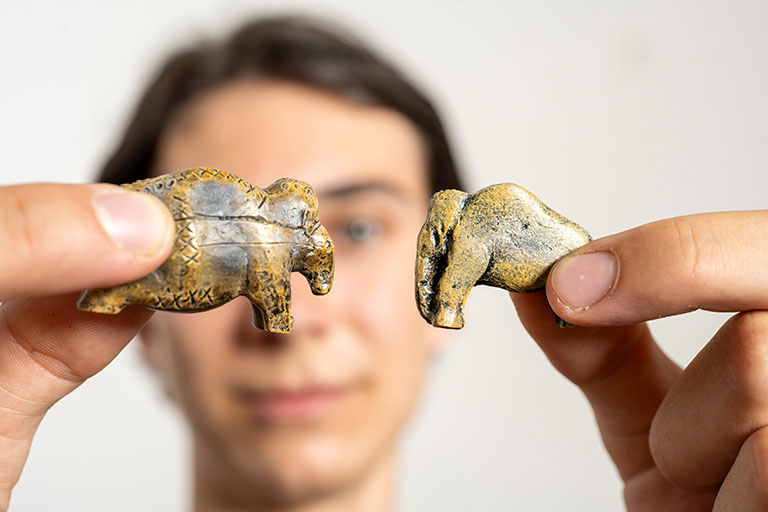Contact
Rotteckring 5
79098 Freiburg im Breisgau
+49 761 201-2574
arco-museum@freiburg.de
Contact
Rotteckring 5
79098 Freiburg im Breisgau
+49 761 201-2574
arco-museum@freiburg.de
Rotteckring 5
79098 Freiburg im Breisgau
+49 761 201-2574
arco-museum@freiburg.de
From the oldest works of art in southern Baden to early medieval Freiburg, the region boasts a rich and varied archaeological heritage. The archaeological museum, housed in the neo-Gothic Colombischlössle, built between 1859 and 1861, offers visitors the opportunity to embark on a journey through thousands of years of human history.
The museum's holdings include a wide range of artefacts, including Stone Age female figures, treasures from Celtic tombs, evidence of Roman achievements and treasures from the early Middle Ages. These unique finds provide an invaluable insight into the past, complemented by models and interactive stations that illustrate the living conditions of each period, and changing temporary exhibitions on particular themes.

Icy cold and unique art – do they go together?
Archaeology says: yes! Around 45,000 years ago, modern humans arrived in Europe and created masterfully crafted works of art. Small sculptures of people and animals still reveal how our ancestors perceived their world. The 23 most famous figures of Ice Age Europe are brought to life here through faithful replicas – touching is not only allowed, it’s encouraged. Highlights of the exhibition include unique originals from the Badisches Landesmuseum, such as a stylised female figure and an intricately decorated perforated baton, both discovered at the former hunting camp at Petersfels near Engen. The melody of a bone flute accompanies visitors on their journey into the caves of the Ice Age.
The new multimedia guide app for the Colombischlössle Archaeological Museum is here:
Spend an exciting time with the ArCo-Museum app at home or on excursions in Südbaden or explore the Archäologisches Museum Colombischlössle in Freiburg on a search for traces. People have left countless remains in the Upper Rhine region over thousands of years. The new app now links outstanding objects from the Archäologisches Museum Colombischlössle with the places where they were found, offers drone films, 3D reconstructions, a map tool and much more.
Learning is best when it's fun: in the comic game “Briana and Enno: Celts for Kids”, young people in particular gain knowledge about trade, technology and socio-cultural exchange in the Iron Age through tricky tasks and puzzles. Briana and Enno have to overcome a number of adventures. A fast-paced chase through the Black Forest provides thrills and the users themselves decide whether the story has a happy ending!
Funding
The ArCo-Museum app was created in cooperation with the State Office for the Preservation of Monuments in the Stuttgart Regional Council and is funded by the Baden-Württemberg Ministry of Science, Research and the Arts and the state initiative “Keltenland Baden-Württemberg”.